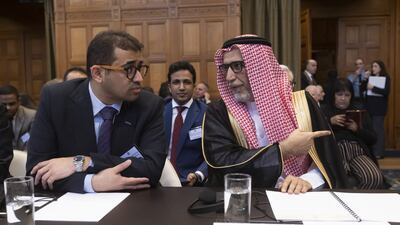Live updates: Follow the latest news on Israel-Gaza
The heavy civilian death toll of the Israel-Gaza war is a consequence of "twisted logic" and decades of illegal occupation of Palestinian territories, a Saudi diplomat told the International Court of Justice on Tuesday.
Ziad Al Atiyah, ambassador of Saudi Arabia to the Netherlands, spoke as the global court's hearings into the legality of Israel's occupation of Palestinian territories, including East Jerusalem, entered their second day on Tuesday in The Hague.
The Gaza war is unrelated to the hearings, which were organised after a request last year by the UN Security Council, but the conflict weighed heavily on the oral statements made by Saudi Arabia and other countries including South Africa and Algeria.
"I believe I speak in consonance with virtually the entire international community in expressing the kingdom’s profound revulsion and condemnation of the horrendous death, destruction and displacement of Palestinian civilians brought about by Israel’s illegal and brutal war," Mr Al Atiyah told the court's 15 judges.
"Israel defends this obscene brutality as the necessary price for defeating Hamas. The Kingdom of Saudi Arabia firmly rejects this twisted logic."
Saudi Arabia's sharp criticism of Israel was echoed by South Africa on Tuesday. Israel is applying a system of oppression against Palestinians worse than apartheid in South Africa before 1994, said Vusimuzi Madonsela, South Africa's ambassador to the Netherlands.
"We as South Africans sense, see, hear and feel to our core the inhumane discriminatory policies and practices of the Israeli regime as an even more extreme form of the apartheid that was institutionalised against black people in my country," he said.
The killing of close to 30,000 civilians and displacement of more than half of the enclave's population of 2.3 million people to the southern city of Rafah are "not justified under any circumstances", Mr Al Atiyah said.
The war was triggered by a Hamas-led attack on Israel on October 7 that killed about 1,200 Israelis. Israel has vowed to destroy the militant group, which controlled Gaza, and has threatened to launch a ground offensive on Rafah.
"Israel's actions have severely dehumanised the Palestinian population, treating them as dispensable objects rather than human beings," Mr Al Atiyah said.

These "disgraceful acts ... demonstrate so vividly how the illegality of the Israeli occupation over more than five decades can generate into the ugliest of consequences".
Mr Al Atiyah also criticised Israel for its five-page written statement submitted to the ICJ, which has not been made public and was sent before the start of the Gaza war.
Israel will not be giving an oral statement, unlike more than 50 countries that have chosen to do so. The ICJ will issue its advisory opinions, which will not be binding, in the coming months.
Israel's statement does not offer "anything substantive" and "focuses almost entirely on why requests for an advisory opinion are somehow improper", Mr Al Atiyah said.
"The only logical conclusion that can be drawn from all of this is that Israeli policies and practices in the occupied Palestinian territories are legally indefensible."
Israeli Prime Minister Benjamin Netanyahu's office said the conflict should be resolved through negotiations. It said the ICJ case was "aimed at harming Israel's rights to defend itself from existential threats".
Mr Al Atiyah also pushed back against claims by some countries – which he did not name – that the ICJ should not issue an advisory opinion on the matter because it might prejudice negotiations for a two-state solution or that it is merely a bilateral issue between Israel and Palestinians.
"The assumption that a serious negotiation process exists is a fiction that defies reality because it asked Israel to forgo occupied territories in exchange for peace," said Mr Al Atiyah, who criticised Israel for rejecting as a "non-starter" a 2002 peace plan put forward by Riyadh and endorsed by the Arab League.
"Since 1967, far from engaging in negotiations Israel has made it virtually impossible to establish a cohesive Palestinian state.
"It has done so by annexing more than two million dunams [a unit of area used in the Levant inherited from the Ottomans] of land, building more than 279 illegal settlements throughout the West Bank illegally, annexing East Jerusalem and declaring Jerusalem as its undivided capital, confiscating natural resources, demolishing Palestinian homes and much more."
Supporting Palestinian rights and their bid for statehood is important for South Africa due to its history of apartheid, Mr Madonsela added.

"The Palestinian cause is one which resonates strongly with the people of South Africa," he said. "That is because the Palestinian struggle evokes mournful memories of our own struggle against apartheid segregation and oppression.
"It is clear that Israel's illegal occupation is also being administered in breach of the crime of apartheid ... it is indistinguishable from settler colonialism. Israel's apartheid must end," added Mr Madonsela.
South African lawyer Pieter Andreas Stemmet called for the withdrawal of Israeli occupation forces, the dismantling of illegal settlements, the right of return and reparation for millions of Palestinian refugees.
Those demands were echoed by representatives from countries that made presentations later in the day, including Bangladesh and the Netherlands.
"The failure of the international community to act decisively to end [Israel's] illegal occupation, annexation of Palestinian territory and settler colonialism, apartheid practices and continued human rights violations form the broader context and the root causes of Israel's current military onslaught on Gaza," Mr Stemmet said.


